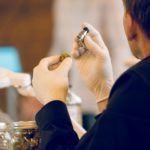
The government of British Columbia has recently closed their public call for feedback on recreational cannabis policy and is now reviewing the results. Apparently this survey was one of the most engaging in the history of BC government with over 48, 000 entries. That is an incredible amount of people and we want to express our gratitude to all that contributed.
While edibles were not included in this survey, and will not be included under the recreational framework until 2019, there is currently a THC potency limit for ACMPR produced cannabis oils which can be use alone or put in food. Licensed producers are limited to 30mg THC per ml. But are these limits based on any evidence or clinical studies that suggest that 30mg per ml is the safest effective dose?
We asked a community of cannabis patients who used cannabis in the form of edibles or oils to see what their effective doses were for their specific conditions, and to find out what they thought about potency limits imposed by the government.
Here are the results from our 82 responses:
The patients we surveyed used cannabis to treat many kind of conditions, from Ehlers Danlos Syndrome to rare forms of MS that causes seizures and tumours, degenerative diseases, life impairing and deeply threatening illnesses that are responsive to cannabis in a range of different dosages. We can see from the results that patients strongly oppose any limits on thc potency in edibles and that many require a higher potency than is legally allowed.
The saying goes, start low and go slow. But when you have a pre-existing tolerance from past use, a natural tolerance due to your individual biology, or require larger doses to treat your specific illness, your “start low” might not be as low as someone else’s
One patient told us that they require 50-100mg of THC for pain relief from migraines that are brought on by a brain tumour and that they much prefer consuming it in the form of edibles over smoking. A patient with MS said they used extremely pure THC oil to help stimulate appetite, relax muscles, and relieve neuropathic pain as well as aide in the recovery from major brain surgeries. This patient also remarked that his wife has noticed a major boost in his libido which she is grateful for. Another patient explained that they require 500mg of THC every 8hrs to treat a serious form of osteoporosis called degenerative disc syndrome. His spine is so fragile it crumbles from simply rolling over in bed. He also suffers from esophageal stenosis and chronic nausea and vomiting. His list of ailments is excessive but he said he found relief from his pain through THC medicine and that he could only find what he needed from a local company, not an LP. We also heard from a responder that they could only handle about 5mg of THC in edibles and that any more would have them going off the walls. The diverse requirements and reactions to THC in a range of doses is obvious, but the reasons for the current limitations are not.
The current limits on potency don’t make sense as the diversity of the human makeup is a constant variable that needs to be accounted for. The differences in rates of metabolism, sensitivities, and reactions make it irresponsible to apply blanket approaches to medicinal cannabis since different bodies require different amounts. As a treatment method, cannabis requires a period of experimentation to determine the lowest effective dose. But as we can see the most effective dose is different for everybody.
The ones who should be making the call on potency limits are the ones who best understand cannabis. Presently, those experts are the patients, long time users, and workers in the grey industry, ie: dispensaries. Ideally, the people who should be advising on potency limits are doctors and scientists. But the reality is that they have been blocked from cannabis research and education so they are not informed on how to prescribe it effectively. It is up to the patient to experiment and as we can see from our survey, many require much larger amounts than what Health Canada permits.
As it stands, medicinal cannabis is being approached with the one-size-fits-all mentality that is traditionally used when prescribing pharmaceuticals. Cannabis cannot be prescribed like a regular pharmaceutical drug, but since doctors and lawmakers are not trained or experienced with the nature of cannabis, they do not know how to go about prescribing it effectively. They just adhere to the protocols of the status quo, but as we can see that is simply not effective.
An individualized system is the best method of care for those seeking cannabis as a treatment method. Since medicinal cannabis requires a period of experimentation, patients need to be equipped with guidelines and well trained doctors who understand how THC works so they can assist patients on their individual cannabis healing journey. Instead of creating arbitrary limitations on THC out of fear of its psychoactive properties, or applying the Big Pharma approach of standardized dosing, the government and medical community ought to invest in better understanding the complexity of cannabinoids. That way they can provide care for people based on their individual needs.
Oversimplifying THC and creating general limitations will end up hindering the treatment of several patients who suffer from severe, but potentially treatable, conditions. The best approach by far is to start low and go slow, but as we can see in our survey results, dose requirements are extremely varied. Suggesting that THC should be limited across the board will only create more obstacles for patients, and we cannot forget that the patient care always come first.
MORE FROM THE BLOG





WAIVER & RELEASE (the “Release”)
This event is conducted by CannaReps Consulting Ltd. (“CannaReps or Company”). Please read and submit below.
I am an attendee at an event hosted by CannaReps (the “Workshop“). I release CannaReps from any and all liability, claims, demands, actions and causes of action whatsoever arising out of or related to any loss, damage or injury, including death, that may be sustained by me while participating in the Workshop.
I understand and agree that:
CONFIDENTIALITY
Any confidential or proprietary information or material relating to the Company’s operations or business which I obtain from the Company or its officers, employees, agents, suppliers or customers or otherwise by virtue of my participation with the Company or by the Company’s predecessor. Confidential or proprietary information or material includes, without limitation, the following types of information or material, both existing and contemplated, regarding the Company or its parent, affiliated or subsidiary companies: corporate information, including contractual licensing arrangements, plans, strategies, tactic, policies, resolutions, patents, trademarks, printed or digitized materials, handouts and brochures. Including any marketing information including sales, investment and product plans, customer lists, strategies, methods, customers, prospects and market research data. Including trade secrets; technical information, including drawings, designs, personal information (the “Confidential Information”).
I understand that the copyright and proprietary interest of any material provided to me belongs to CannaReps. All shared experiences from the Workshop are to remain confidential and private. I agree not to disclose any of the information learned during the Workshop outside of the Workshop except with others who attend the Workshop. I will not use any audio or video recording equipment during the Workshop, unless CannaReps approves of the recording and filming by providing prior written consent. I understand that any audio or video recording made during the Workshop is the property of CannaReps. I will not use CannaReps’ information for business or commercial purposes, without first obtaining the prior written consent of CannaReps.
INTELLECTUAL PROPERTY
I understand, acknowledge and agree that all copyright, trademarks, trade secrets, intellectual property rights, and any other rights arising from any designs, and all of the work products and materials conceived, developed or created by the CannaReps and any rights ancillary thereto (collectively, “Intellectual Property Rights”) which were solely or jointly with others, conceives, designs, creates, derives, develops or makes in the course of or in connection with the work with CannaReps shall belong solely to CannaReps. If you haven’t already, you shall promptly disclose to CannaReps in writing any and all Intellectual Property Rights, conceived, created, derived, developed or made in the course of or otherwise in connection with my participation with CannaReps, whether alone or with others, and whether during work shop hours or through the use of facilities and properties of CannaReps.
INDEMNITY
I agrees to indemnify and hold harmless CannaReps, its officers and directors, employees and its affiliates and their respective successors and assigns and each other person, if any, who controls any thereof, against any loss, liability, claim, damage and expense whatsoever (including, but not limited to, any and all expenses whatsoever reasonably incurred in investigating, preparing or defending against any litigation commenced or threatened or any claim whatsoever) arising out of or based upon any false representation or warranty or breach or failure by me to comply with any covenant or agreement made by me herein or in any other document furnished by me to any of the foregoing in connection with this transaction.
CONSENT
Notwithstanding the immediately preceding paragraph, I consent to and grant CannaReps, the Workshop, and its assignees, the right to photograph and record me, my name, voice, appearance and likeness and other material furnished by me for use on trusted online media which include, but are not limited to, their website and social media pages. My hereby release said matter in perpetuity to CannaReps without prejudice and acknowledge that this consent is freely given without expecting compensation.
By submitting my email address below, I agree to receive electronic communication from CannaReps including personal course information, news, updates and promotions regarding CannaReps’ products. I understand that I can withdraw my consent at any time.
PRIVACY POLICY
Protecting your privacy is important to CannaReps. This Privacy Policy (“Privacy Policy”) set outs the ways in which we use your information and how we ensure its protection.
CannaReps will only collect personal information (“Information”) that will allow us to provide, enhance, market or improve our events and services. Information is collected by means of registration for any CannaReps sponsored event or service. Information collected may include name, age, gender, address, email address, payment information, and geographical information.
CannaReps may share Information. CannaReps retains the right to share Information and other statistics with our partners, prospective advertisers, and other third parties for the purposes of improving, protecting, enhancing, and promoting our events and services. CannaReps may also disclose information to our affiliates, agents, contractors, and service providers in order to facilitate the functioning and maintenance of our events and services. We will not sell any information to advertisers or other third parties.
This Privacy Policy only covers the treatment of Information and other non-identifiable information gathered by CannaReps. This Privacy Policy does not apply to the practices of any third-party services. CannaReps does not take responsibility for the content or privacy policies of any third parties. CannaReps recommends that you review the privacy policies of any third-party service providers or events you access, use, or register for through our events or services.
This Privacy Policy has been established to help you understand our commitment to protecting your privacy. CannaReps reserves the right, at any time, to change or replace any portion of our Privacy Policy. You will be notified of any changes, if we believe, they materially impact your experience at our events or services. Continued use of our services after any change to the Private Policy constitutes an acceptance of those changes.
By submitting this Release and providing Information during the registration process, including the Exhibitor’s Agreement, you consent to the collection and use of your Information for these purposes.
If you have any questions or concerns please email us at info@cannareps.ca.